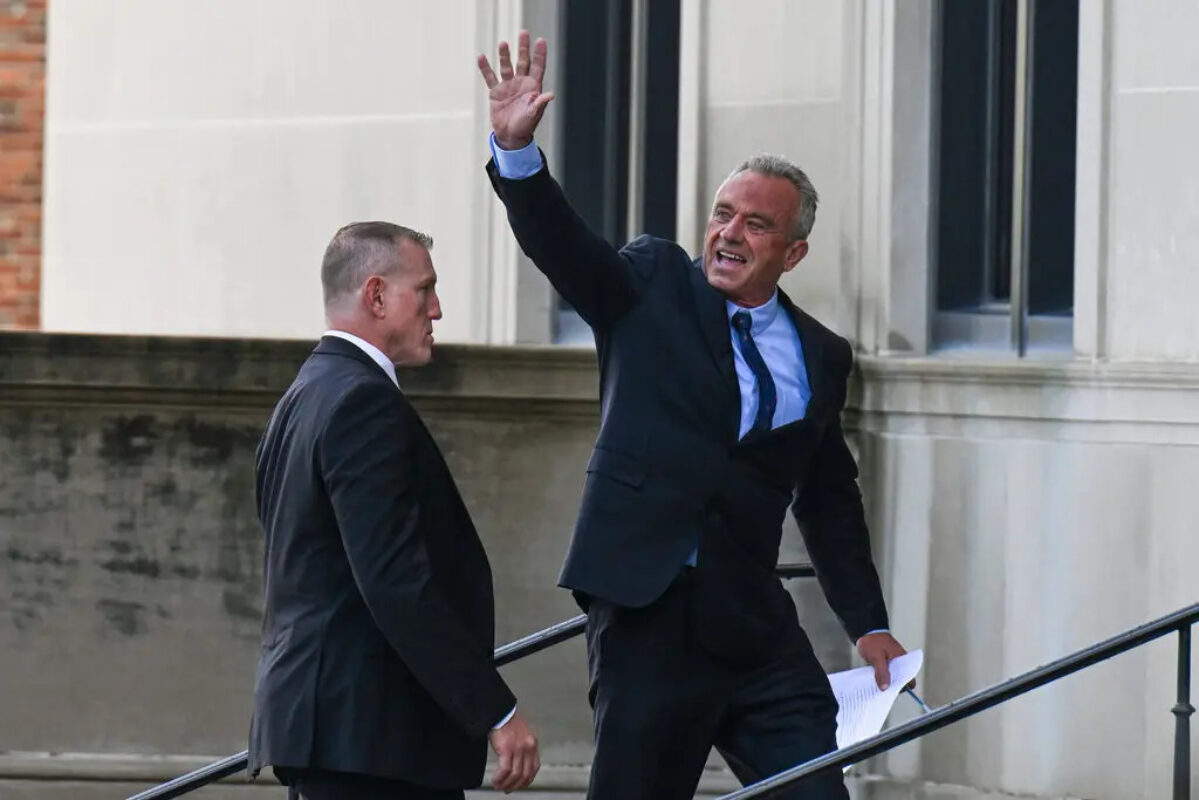8-7-2024 -As seen in the New York Times - Kennedy’s Wife and Birds Live in California. He Says It’s Not Home. William F. Savino represents Robert F. Kennedy, Jr. in New York matter.

The presidential candidate Robert F. Kennedy Jr. testified in Albany in an attempt to stay on New York’s ballot. If he is kicked off, other states could follow.
Jesse McKinley, reporting from Albany, N.Y., has covered trials involving two candidates for president this year, including Donald J. Trump’s prosecution.
Aug. 7, 2024
Battling a lawsuit challenging his right to be on the New York ballot, Robert F. Kennedy Jr. on Wednesday insisted that “I’m a New Yorker,” even though he has lived on the West Coast for the past decade.
Mr. Kennedy, who is running for president as an independent, appeared in his own defense in the challenge from four voters who say he used a false address in Katonah, N.Y., on nominating petitions. The challenge being heard in an Albany courthouse argues that the Katonah residence is not his, but that of a friend, and thus the signatures on Mr. Kennedy’s petitions are invalid.
While Mr. Kennedy is unlikely to win an electoral victory in New York — or any state, if polls hold true — a decision to knock him off the ballot would be likely to lead to lawsuits in other states where his campaign used the same address to gather signatures.
Such a chain of events could have profound effects on the November election — Mr. Kennedy is seen as a threat to the candidates from both major parties in a close race. But testimony on Wednesday sometimes veered into the surreal, with questions about training protocols for wild birds.
In order to show Mr. Kennedy’s connection to California, where he has a home with his wife, the actress Cheryl Hines, a lawyer for the voters asked about his fondness for ravens. Mr. Kennedy said he liked to train them to eat out of his hand and perform tricks like putting poker chips in people’s pockets.
“Mr. Kennedy, how long would it take you to teach a raven to talk?” asked the lawyer, Keith M. Corbett, apparently seeking to show that the candidate spent a lot of time on such activities at his home in Los Angeles.
Mr. Kennedy confirmed that raven training was time-consuming, but said that others at the Los Angeles house handled bird duties while he was on the campaign trail.
Mr. Corbett tried to show that Mr. Kennedy had an active falconry license in California, something that he had denied in a sworn July 2 affirmation to the court. On Wednesday, Mr. Kennedy said he did not believe he did, and asserted he had “never practiced falconry” in California.
Mr. Kennedy has been associated with animal-related episodes in the past, and they flared up again this week when the candidate admitted in a video that he had collected, at roadside, a dead baby bear, and then deposited it in Central Park in 2014. That prank, which he thought would be “amusing,” resulted in negative headlines and mockery from many quarters.
After finishing his testimony on Wednesday, Mr. Kennedy sidestepped the bear ordeal, saying that he’d rather talk about issues like mortgages and the price of groceries. But, after he was asked if he’d picked up anything else off the road, he said: “I’ve been picking up roadkill my whole life. I have a freezer full of it. A thousand cubic-foot freezer.” A spokeswoman later clarified that the freezer was actually 21 cubic feet, and that the candidate no longer has it. The whereabouts of the roadkill was unclear.
Mr. Kennedy also commented on reports that he had dined the night before with Scott Ritter, a former United Nations weapons inspector and vocal opponent of U.S. intervention in Ukraine whose house was raided on Wednesday by state police and the F.B.I. He said he’d dined with Mr. Ritter, who was convicted more than a decade ago in an online sex sting, because he admired “his stance on foreign policy and trying to keep this country out of a nuclear war.”
Such episodes have not prevented Mr. Kennedy, an environmental lawyer and scion of the famed political family, from attracting a small but passionate group of followers, some of whom appeared Wednesday for the hearing’s third day in State Supreme Court. The case, backed by Clear Choice, a Democratic-aligned political action committee, will be decided by a judge, Christina L. Ryba, who is hearing the arguments without a jury.
Under questioning from his lawyer, William F. Savino, Mr. Kennedy insisted that he had “every kind of affiliation with this state.”
“There was a time I knew almost every Democratic officeholder in the state,” he said, noting that he had considered running for New York attorney general in 2006.
Mr. Kennedy’s opponents have suggested that he used the New York address because of a constitutional quirk that prevents presidential and vice-presidential candidates who come from the same state from receiving its Electoral College votes. Mr. Kennedy’s running mate, Nicole Shanahan, also lives in California, which is the nation’s richest electoral prize, with 54 votes.
Mr. Savino brought up this issue. After initially not answering directly, Mr. Kennedy denied that the Electoral College had anything to do with his decision to use the Katonah address.
In earlier testimony, Mr. Kennedy admitted that he had no written agreement at the property in Katonah where he claimed to live, in a spare bedroom of a friend. That friend, Barbara Moss, testified Tuesday that Mr. Kennedy had recently started paying $500 a month in rent and had received mail at the house.
But Ms. Moss also said that she had received money from Mr. Kennedy only in late May — a lump sum of $6,000, or one year’s rent — a day after a New York Post story appeared questioning his residence. A photo of the spare bedroom displayed at the hearing showed only a few of Mr. Kennedy’s possessions, including what he thought was a photo of himself and Mick Jagger; the bed, bedding and furniture were all Ms. Moss’s, he conceded.
On Wednesday, Mr. Kennedy said that he had not paid rent until recently because of an oversight and that the $6,000 was a “catch-up payment.”
He insisted his situation in California, where he has lived with Ms. Hines since 2014, was temporary and would last only until she stopped acting in Los Angeles and they could come back to New York.
“It was a hardship for me to move to California,” he said, though he added that he did it “gratefully out of love.”
“I never intended it to be permanent,” he said. “I always intended to return to New York.”
Jesse McKinley is a Times reporter covering upstate New York, courts and politics.


